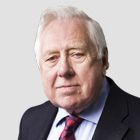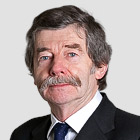Maurice Peston, Lord Peston, who has died aged 85, was one of the most distinguished economists of his generation, but he did not regard the discipline to which he devoted much of his life as the dismal science. To him, economics in the right hands was a weapon to be used in the battle for a socially just, and therefore more equal, society. The combination of formidable intellect, irrepressible (often acerbic) sense of humour, and sheer zest for life, made his company a delight.
Like so many Londoners of his time, Maurice – the son of Abraham, a “pleater” in the garment trade, and Yetta (nee Malt) – was evacuated during the second world war. So he began his education in Bradford, at Belle Vue school. It continued, back in London, at Hackney Downs, where he was – together with his contemporary Harold Pinter – one of the stream of bright Jewish boys that the school produced. He read for his undergraduate degree at the London School of Economics, where he was awarded a first and won a Fulbright scholarship to Princeton. He returned to Britain for national service and – because of his research in the US into game theory – he was promoted to senior scientific officer in the Army Operational Research Group. Still in his mid-20s, he held the notional rank of lieutenant colonel.
Then, in 1957, it was back to the LSE – first as an assistant lecturer and eventually as reader in economics. At the age of 34, he was invited to establish and head an economics department in Queen Mary College in the University of London. He remained there for more than 20 years (retiring as emeritus professor in 1988), publishing erudite works on macroeconomics, but devoting more and more time to public affairs. He had been an economic adviser to the Treasury (1962-64), during the dying days of the Conservative government of Alec Douglas-Home; to the Ministry of Defence (1964-66), when Denis Healey was secretary of state; and to the House of Commons select committee on nationalised industries (1966-70 and 1972-73). But it was during the second Harold Wilson government that Maurice became a thoroughgoing politician.
I first met Maurice in 1965 when, together with a Tory backbencher, I debated, in front of an audience of sixth-form school students, the merits (or otherwise) of the budget. Maurice was in the chair and, after our initial presentations, thought it right to award us marks. My speech was awarded a B-, a grade that I still resented even after my opponent’s contribution was classified as C. When I became the Labour party’s education spokesman in 1972 – shadowing Margaret Thatcher – I naturally turned to Maurice for advice. Education, particularly the promotion of the comprehensive principle, had always been at the heart of his political philosophy. For years, he and Helen, his wife, campaigned for an end to secondary selection in London.
Not long after my frontbench appointment, I was required to speak on a government white paper, A Framework for Expansion. It ended with a statistical annexe, which I could not understand. Despairing of my ability to follow his explanation, Maurice drafted a paragraph that I read out with as much conviction as I could muster. The message was clear enough. Either by intention or mistake, Thatcher had published bogus figures. The accusation provoked outrage – first in the House, then in the press. After two weeks of raucous disagreement, the editor of the Times Educational Supplement telephoned me to say that he proposed to end the argument by consulting the only acknowledged expert on education expenditure, Professor Maurice Peston. Maurice concluded that I was right. Thatcher refused to apologise.
In 1974, when Labour was re-elected, Reg Prentice became education secretary and he appointed Maurice as his special adviser. When Prentice left the cabinet and I joined it, as secretary of state for prices and consumer protection, Maurice moved over to me. On the day of his arrival at the department, the permanent secretary, apprehensive about having a professor cuckoo in his nest, asked the new arrival: “How do you see your role?” Without pause or hesitation, Maurice replied: “To give spurious intellectual justification to the secretary of state’s political prejudices.” That answer deserves a place in both the Oxford Dictionary of Humorous Quotations and in textbooks on modern cabinet government.
Perhaps a more important indication of Maurice’s character was the permanent secretary’s expressed fear that my department was not big enough to justify a special adviser with the rank of deputy secretary – an eminence that Maurice had enjoyed at Education. Maurice was unmoved. The government’s economic policy was a good cause. So his services were available at whatever level the civil service department thought appropriate. But he felt it necessary to temper his apparent piety with a joke. He would require a car park place and that was not negotiable. He got both the higher rank and space on the forecourt.
Both Maurice and I had doubts about Healey’s IMF austerity package and Maurice correctly forecast that the public sector borrowing requirement would not turn out to be in so large a deficit as the Treasury predicted. In fact the PSBR was probably in surplus. Bernard Donoughue, in the second volume of his Downing Street Diary, recounts telling Shirley Williams that she needed someone of Maurice’s calibre to help her make sense of the interminable cabinet discussions. In the end, Maurice accepted that the Healey medicine had to be swallowed. It was the only remedy that would restore international financial confidence. And if that could not be achieved without the cabinet jumping off Westminster Bridge, “the cabinet will have to jump”.
After Labour’s defeat in 1979, Maurice returned to academia, but continued to advise the party in opposition. In 1987 he was made a life peer. He developed an admirably pragmatic relationship with the House of Lords. He respected it as a house of parliament, enjoyed regular participation in its debates and chaired both its economic committees – as well as, briefly, its catering committee. He served on the opposition frontbench and his speeches were so admired that his omission from the Blair government was an astonishment on all sides. But he was never caught up in its false camaraderie. Maurice always knew which side he was on. He did not wear his principles on his sleeve but he stuck to them with uncompromising certainty.
Maurice was supported and sustained for almost 60 years by Helen (nee Cohen) – a woman of distinction in her own right. It would be hard to imagine a closer or better-matched partnership. At the celebration of their golden wedding in 2008, Robert, their oldest son, spoke eloquently of the public service given to society by one of his parents and added: “The other one is quite a good economist.” Maurice would, and did, gladly acknowledge the debt he owed to Helen and the joy they had shared with their three children, Robert, Juliet and Edmund. They and two grandsons, Simon and Maximilian, survive him.
Roy Hattersley
William Keegan writes: Academic economists are not always the liveliest of teachers and lecturers. Maurice Peston was an outstanding exception, as a stream of his more notable former pupils will testify, not least David (“Danny”) Blanchflower, a sometime member of the Bank of England’s monetary policy committee, and now a professor at Dartmouth College in the US, and Gerard Lyons, currently enjoying the challenging role of being economic adviser to the mayor of London. Colette Bowe, now chair of the Banking Standards Board, was Maurice’s first student, in 1966.
In 2004 Queen Mary College instituted an annual Peston lecture in his honour. The inaugural lecture was given by his old friend Roy Hattersley and the most recent by Mark Carney, governor of the Bank of England.
Maurice was proud of being told that a television programme he presented for the Open University – on the dry subject of fiscal policy – was one of its most popular ever. He combined expertise in labour economics with broader macroeconomic policy, and, when Keynesian economics entered the doldrums he despairingly entitled one of the many books he published Whatever Happened to Macroeconomics? (1980).
He chaired the House of Lords committee on monetary policy from 1998 to 2001, and after that the Lords economic affairs committee, with considerable relish and panache, sometimes annoying fellow members with what they regarded as his excessively confident approach – this was the time when the monetary independence of the Bank of England was in its infancy, the birth of the euro was a hot topic, and there was plenty of scope for scepticism.
I first met Maurice in the late 1960s, when I was on the Financial Times and reporting on a meeting of the Society of Business Economists. Some of the proceedings were hardly a bundle of fun, but, with all that lecturing experience, Maurice gave an outstanding and optimistic talk at a time when there was excessive gloom in the air about the aftermath of the 1967 devaluation. But it was not until after I joined the Observer in 1977 that I got to know Maurice well and became an ally of his in sticking to the Keynesian faith during the rise of monetarism.
From time to time Maurice would be a welcome guest columnist for the Observer In My View column, and we once combined forces in a pre-election debate in 1983 in Preston town hall. This had been the scene of a famous speech by Keith Joseph in 1974, where he had unashamedly advocated higher unemployment as part of the burgeoning monetarist crusade adopted by Margaret Thatcher.
By 1983 unemployment was indeed soaring, and Maurice and I did our best to argue for a reflationary policy. Unfortunately this was the election when the Labour MP Gerald Kaufman described the Labour manifesto as “the longest suicide note in history” and the debate was hard going. We needed consolation. There was to be no restaurant car on the way back from Preston, but Maurice managed to make a quick purchase of a bottle of claret, which we opened with a Swiss army knife, and we drowned our sorrows.
Maurice was always great fun to be with. One of his favourite stories was the time he was sharing a House of Lords office with Lord Rix, famous as the actor Brian Rix for his appearances in the Whitehall farces. One day Maurice forgot something, returned to the office and was deeply embarrassed to find Rix changing for dinner, with his trousers down. According to Maurice, Rix said: “Don’t look so shocked. People used to pay to see me do this.”
Maurice had an appealing mischievous streak, right to the end. His son Robert says that, as he lay terminally ill in St Thomas’ hospital, Maurice, while expressing gratitude for his wonderful treatment at the hands of the NHS, added that, as an economist, he was not sure it was worth “the marginal cost” of keeping him alive.
• Maurice Harry Peston, Lord Peston, economist, born 19 March 1931; died 23 April 2016












